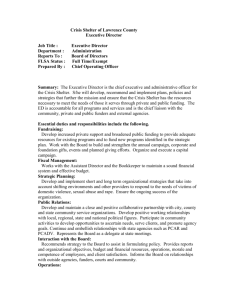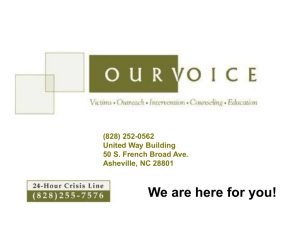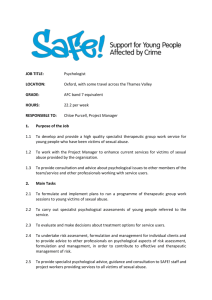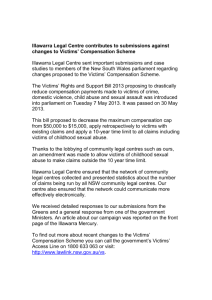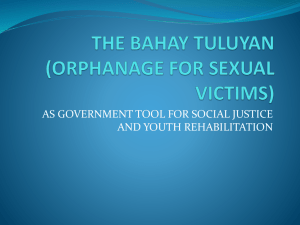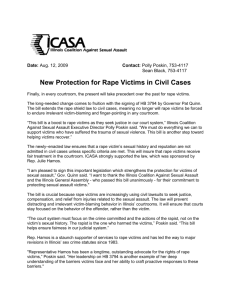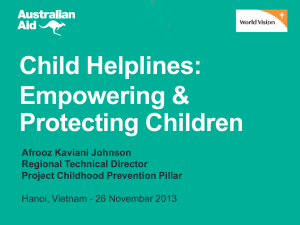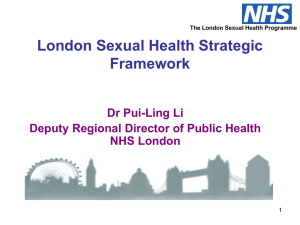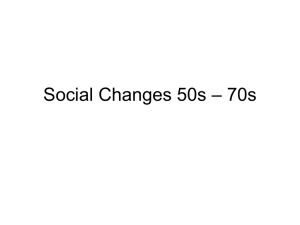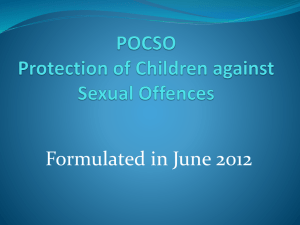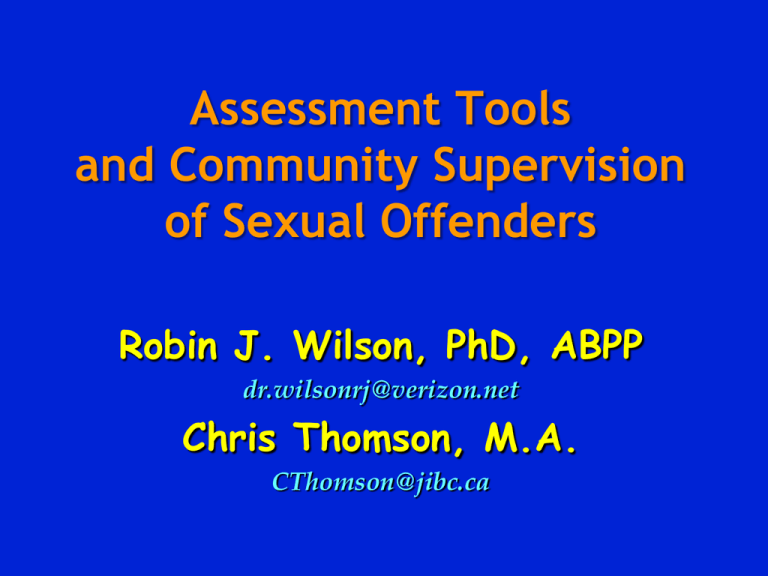
Assessment Tools
and Community Supervision
of Sexual Offenders
Robin J. Wilson, PhD, ABPP
dr.wilsonrj@verizon.net
Chris Thomson, M.A.
CThomson@jibc.ca
Risk Factor
Codes
Score
Young
Aged 18 – 34.99
Aged 35 – 39.99
Aged 40 – 59.99
Aged 60+
Ever lived with lover for at least two years?
Yes
No
No
Yes
No
Yes
Charges
Convictions
None
None
1-2
1
3-5
2-3
6+
4+
3 or less
4 or more
No
Yes
No
Yes
No
Yes
No
Yes
Add up scores from individual risk factors
1
0
-1
-3
Single
Index non-sexual violence
Prior non-sexual violence
Prior Sex Offences
Prior sentencing dates
Convictions for non-contact sex offences
Any Unrelated Victims
Any Stranger Victims
Any Male Victims
Total Score
0
1
0
1
0
1
0
1
2
3
0
1
0
1
0
1
0
1
0
1
STATIC-99
Sexual Reconviction Rates
1
0.8
Low
Medium-Low
Medium-High
High
0.6
0.4
0.2
Years after release
24
21
18
15
12
9
6
3
0
0
Actuarial Scales
Strengths
•
•
•
•
•
Valid risk factors
Explicit rules for combining factors
Explicit probability estimates
Robust across settings & samples
Easily scored
Actuarial Scales
Weaknesses
• Only moderate predictive accuracy
• We always want to do better!
• Coding rules are confusing
• You need to pay attention to rules
• Neglects important factors
• Sexual Deviance (Phallometrics)
• All Dynamic Factors
Will the change endure?
90
80
70
60
50
40
30
20
10
0
01
20
99
19
97
19
19
95
Karl
Andrew
• Exceptional
circumstances?
• Major life change?
• Opportunity?
• External pressure?
• Quality of evidence
• New base line?
Return to Base Line
90
80
70
60
50
40
30
20
10
0
01
20
99
19
97
19
19
95
Karl
Andrew
New Base Line
90
80
70
60
50
40
30
20
10
0
01
20
99
19
97
19
19
95
Karl
Andrew
Stable-2007 Items
• Significant Social Influences
• Capacity for Relationship Stability
• Emotional ID with Children (Only score this item for offenders with
victims age 13 or younger)
• Hostility toward women
• General Social Rejection
• Lack of concern for others
• Impulsive
• Poor Problem Solving Skills
• Negative Emotionality
• Sex Drive
• Sex Preoccupation
• Sex as Coping
• Deviant Sexual Preference
• Co-operation with Supervision
Acute Factors
Victim Access
Sexual Preoccupations
Hostility
Rejection of Supervision
Emotional Collapse
Collapse of Social Supports
Substance Abuse
Keys to Effective Treatment
and Risk Management
We need to pay attention to RNR principles:
interventions should be appropriate to level of RISK
interventions must target criminogenic NEEDS
interventions must consider RESPONSIVITY concerns
Research has suggested that programs which
appropriately address these principles can help to
reduce risk for recidivism.
COMMUNITY SUPERVISION SUGGESTIONS
12
KNOW YOUR CLIENT’S SEXUAL OFFENSE HISTORY
•THE AGE RANGE AND NUMBER OF PAST VICTIMS
•THE GENDER OF PAST VICTIMS
•THE MODUS OPERANDI USED TO ENGAGE PAST VICTIMS
•THE SET-UPS OF PRECURSORS TO HIS SEX CRIMES
•THE TYPES OF DEVIANT SEXUAL BEHAVIOUR HE HAS ENGAGED IN
•THE HIGH RISK SITUATIONS ASSOCIATED WITH HIS SEX CRIMES
13
MODERATING FACTORS CLIENT SUPERVISION
THE CLIENT HAS A RESPONSIBLE LIFESTYLE
SUPERVISOR REINFORCES PRO-SOCIAL ATTITUDES AND ACTIVITIES
HE EXPRESSES HIS SEXUALITY APPROPRIATELY
HE HAS A GOOD SUPPORT NETWORK
HE CAN IDENTIFY HIS EMOTIONAL TRIGGERS AND EXPRESS HIS
FEELINGS IN PRO-SOCIAL WAYS
HE CAN IDENTIFY AND AVOID HIS HIGH RISK SITUATIONS
IF HE HAS A LAPSE, HE WILL TELL SOMEONE
14
THREE MAJOR WARNING SIGNS YOUR CLIENT
IS AT INCREASED RISK TO REOFFEND
15
•HE HAS RECENT NEGATIVE LIFESTYLE CHANGES
•HE BEGINS TO DEMONSTRATE PATTERNS THAT
WERE PRESENT DURING OFFENSE CYCLE
•HE BEGINS TO ENTER HIGH RISK SITUATIONS
16
SEVEN SPECIFIC TECHNIQUES TO HELP
MONITOR & SUPERVISE YOUR CLIENT
GO OVER HIS SELF MANAGEMENT PLANS AND
GOALS AT EACH PROBATIONARY MEETING
REINFORCE PRO SOCIAL ACTIVITIES AND
ATTITUDES
ALLOW HIM TO SPEAK FREELY
BE SPECIFIC WHEN QUESTIONING HIM
17
MAKE USE OF COLLATERAL NETWORK, PARTICULARLY TREATMENT
PROVIDER IF STILL IN TREATMENT
TAKE GOOD CASE NOTES
IF DRUGS/ALCOHOL WERE FACTORS IN OFFENSE, CHECK TO SEE
PRESENT USE
18
Contact Information
Robin J. Wilson, PhD, ABPP
Wilson & Associates
Clinical and Forensic Psychology
941 806 9788
dr.wilsonrj@verizon.net
Chris Thomson, M.ED.
Justice Institute of British Columbia
Corrections and Community Justice Division
cthomson@jibc.ca


